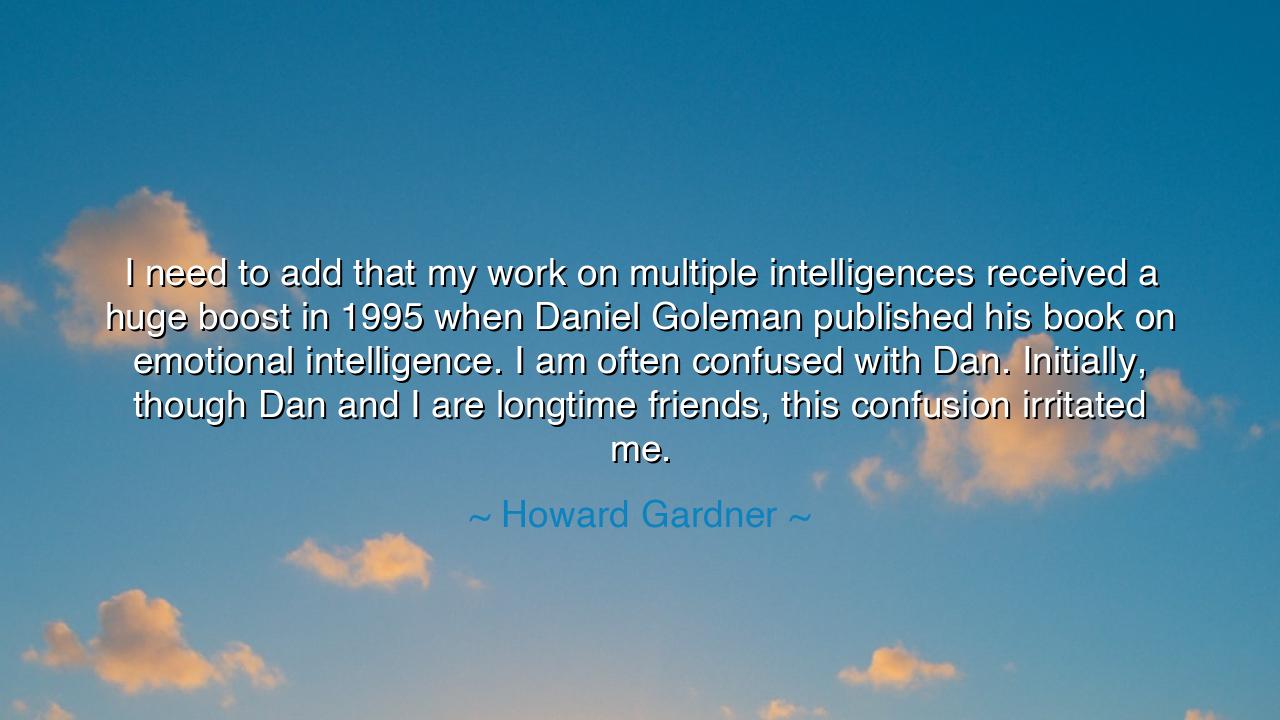
I need to add that my work on multiple intelligences received a
I need to add that my work on multiple intelligences received a huge boost in 1995 when Daniel Goleman published his book on emotional intelligence. I am often confused with Dan. Initially, though Dan and I are longtime friends, this confusion irritated me.






The words of Howard Gardner, spoken with the quiet dignity of a scholar and the humility of a sage, offer us a lesson not only in intellect but in the nature of recognition, misunderstanding, and legacy. “I need to add that my work on multiple intelligences received a huge boost in 1995 when Daniel Goleman published his book on emotional intelligence. I am often confused with Dan. Initially, though Dan and I are longtime friends, this confusion irritated me.” In these words we find the paradox of greatness—that even the wise, when their ideas take flight, must watch them soar into the hands of others, sometimes transformed beyond recognition. Yet through that transformation, the idea gathers new life, spreading farther than its creator ever imagined.
Gardner, the father of the theory of multiple intelligences, gave the world a new vision of the human mind. He taught that intelligence was not a single, cold beam of logic, but a constellation of gifts—linguistic, musical, spatial, kinesthetic, interpersonal, and more. His insight shattered the tyranny of a single standard of intellect and allowed countless souls to see themselves as capable, creative, and wise in their own ways. Yet when Daniel Goleman published his work on emotional intelligence, a term that soon captivated the world, the two ideas began to intertwine in the minds of the public. The people, in their eagerness to name their awakening, confused one messenger for another.
And this, Gardner admits, was at first an irritation—for who among us does not long to be known for our true labor, our authentic voice? It is the ancient ache of the thinker, the artist, the builder: to see one’s vision reflected through another’s mirror, bright but altered. Yet in time, as Gardner reflects, he came to see that Goleman’s success gave wings to his own work. The river of understanding had widened, and though its tributaries bore different names, they all flowed toward the same sea—the deeper comprehension of the human spirit.
The ancients knew this story well. Consider Socrates, whose teachings gave birth to Plato, who in turn became the master of Aristotle. Each disciple carried the flame of the master, but each reshaped it in his own hands. Socrates himself left no written word, and yet his thoughts endured through others, sometimes blurred, sometimes brightened. Had he lived to see his name misused or mistaken, perhaps he too would have felt that sting of confusion—and yet he would have known that truth does not belong to one man. Once spoken, it belongs to the world, and the wise must rejoice that it continues to live, even in unfamiliar forms.
Gardner’s friendship with Goleman teaches another sacred truth: that rivalry can exist within respect, and irritation can be the shadow cast by admiration. The wise do not let envy consume them, for they know that the world is vast, and that each thinker, each creator, contributes to the greater architecture of understanding. Intelligence, whether multiple or emotional, is not a possession—it is a current of divine curiosity that passes through many hands. When two great minds walk the same path, it is not confusion that matters, but the illumination they create together.
There is, too, a deeper message for all who labor in thought or art. When your work is misunderstood, or when another receives praise for something born of your influence, remember Gardner’s journey. The ego cries for clarity, but the soul rejoices in continuity. The true creator seeks not fame, but impact. What matters is not the name remembered, but the idea sustained, the change sparked in the hearts and minds of others. As the old saying goes: “A tree cares not who eats its fruit.”
Therefore, let this wisdom be your guide, O seeker of purpose: create for truth, not for credit. When your work inspires others, even imperfectly, give thanks. When your ideas are borrowed or reshaped, take heart—they have entered the living stream of time. And when you feel the sting of being misunderstood, remember that every great thinker has walked that path. The light you kindle will cast its glow beyond your reach, and though others may stand in its radiance, it is still your flame that burns at its core.
For in the end, as Gardner discovered, the true victory of intellect is not ownership but endurance—the knowledge that what you have built will outlast you, reshaped by many hands, remembered by many names, yet forever rooted in the soil of your labor.






AAdministratorAdministrator
Welcome, honored guests. Please leave a comment, we will respond soon